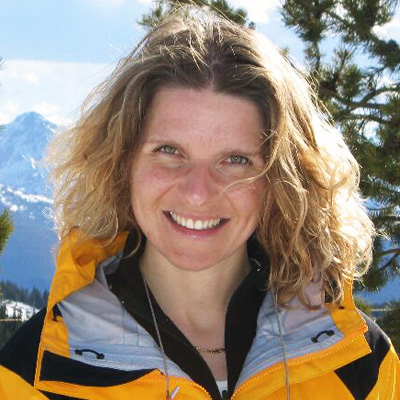Adaptive meshes provide fast and accurate weather predictions at the local scale
In 2005, Hurricane Katrina became one of the costliest natural disasters and deadliest hurricanes in US history. While in part it is the nature of hurricanes and blizzards to be difficult to predict, Hurricane Katrina taught the nation that a successful collaboration between scientists and policymakers is needed to save the lives of thousands of people. Dr. Christiane Jablonowski, Associate Professor of Atmospheric, Oceanic, and Space Science at the University of Michigan, pushes the frontiers of today’s climate and weather models. In particular, she develops and tests variable-resolution mesh techniques, called Adaptive Mesh Refinement (AMR), that can zoom into areas of interest, like a hurricane, with very small grid spacings while keeping calm atmospheric regions at coarser grid resolutions. In other words, her models allow her to scan the broad picture of weather occurrences while zooming in on particular areas of interest. In this way, Dr. Jablonowski’s models have the potential to provide accurate weather and climate information at regional and local scales which is urgently needed by many stakeholders, like farmers, emergency managers, city planners, hydrologists, and policymakers.

Dr. Jablonowski’s modeling technique provides very accurate representations of hurricanes and other extreme weather events while being highly economical from a computational standpoint. The adaptive grids can be moved with the hurricane and thereby track its destructive path. Additionally, her variable-resolution research builds a bridge between the societal demand for high-resolution weather and climate predictions and currently available high-performance computing resources. The variable resolution mesh decreases the computational workload and makes computations fast while providing local weather and climate information in selected regions. This key technology has the potential to become the default in many future-generation weather and climate models. By contributing to the scientific foundation that will make weather and climate predictions at the regional and local scale trustworthy and possible at affordable computational cost, Dr. Jablonowski pays tribute to the pressing societal need for accurate climate and weather information at the local scale.
Current research includes:
-
Tropical cyclones: Tropical cyclones are among the most destructive weather systems on Earth and their representation in weather and climate models is impacted by the model grid spacing, numerical method, the representation of clouds, the land-sea interaction, and many more factors. Models have difficulty forecasting tropical cyclones reliably for long lead times which is imperative for coastal communities. Dr. Jablonowski’s AMR research contributes to an improved representation of hurricanes in global weather and climate models.
-
Dynamical Core Model Intercomparison Project (DCMIP): Dr. Jablonowski is a lead founder of DCMIP. Every four years DCMIP brings the international weather and climate modeling community together and evaluates the emerging fluid dynamics components of weather and climate models via newly-developed idealized test cases. DCMIP reveals the strengths and weaknesses of the numerical designs of current and future-generation weather and climate models and has established new model evaluation standards.
-
Impact of waves: Dr. Jablonowski and her team investigate wave-driven atmospheric phenomena, like polar Sudden Stratospheric Warmings (SSWs) or the tropical Quasi-Biennial Oscillation (QBO) in the upper atmosphere (at heights of about 30-50 km) which are fascinating examples of the impact of waves on the overall air circulation. The interactions are poorly understood and modeled. Her group sheds light on such interactions via idealized model assessments which can clearly distinguish between causes and effects.
Bio
Dr. Christiane Jablonowski’s research lies at the interface between atmospheric fluid dynamics, applied mathematics, and scientific/high-performance computing. In particular, her work focuses on variable-resolution meshes and numerical techniques for weather and climate models which make model predictions fast and more accurate. Dr. Jablonowski is the recipient of a US Department of Energy (DoE) Early Career Award and the Presidential Early Career Award for Scientists and Engineers (PECASE) which is the highest honor bestowed by the US government on outstanding scientists and engineers. She is the current co-chair of the Atmospheric Model Working Group at the National Center for Atmospheric Research (NCAR) and thereby steers the development of a leading US climate model. Dr. Jablonowski also teaches ‘Parallel Computing’ tutorials on a regular basis which reflects her dedication to the computational sciences.
Dr. Christiane Jablonowski spent much of her childhood years “exposed to the elements.” Whether sailing, bicyling or exploring the outdoors, she was always naturally curious about the seemingly unpredictable changes in the weather and climate. While considering her future professional career, Dr. Jablonowski recognized that weather patterns change in fascinating ways and therefore, it would be an excellent pathway to pursue. After completing high school, Dr. Jablonowski finished a bachelor and masters degree in meteorology in Germany and worked with the German Weather Service on their newest weather prediction model. She found that weather and climate prediction allowed her to combine her multidisciplinary areas of expertise which bridge the physical, mathematical, and computational sciences. Her experience with the weather service and in school made her passionate about a lifetime career in advancing the predictability of weather and climate changes for the betterment of society as a whole.
In her free time, aside from research, Dr. Jablonowski enjoys riding motorcycles, hiking, kayaking and ballroom dancing. She also enjoys gardening and, most recently, began perfecting her bread baking skills.
Website: http://aoss-research.engin.umich.edu/groups/admg/index.php


